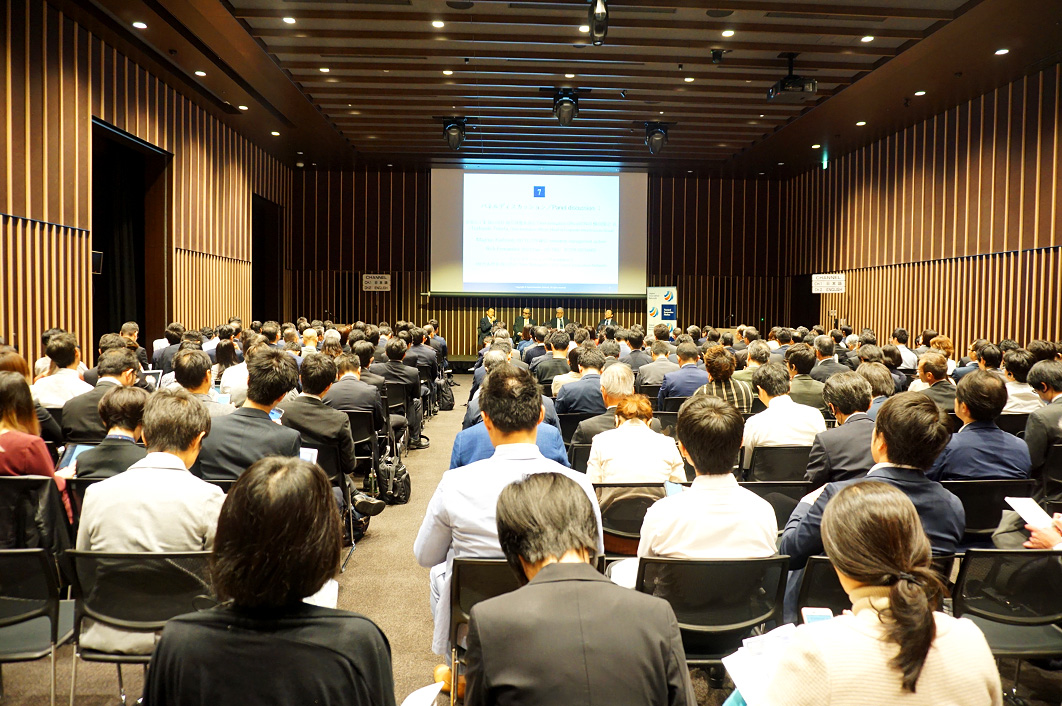Newsニュース
ISO Technical Committee representatives from France, Sweden and the U.S. offered insights at the JIN Innovation Management System Forum on October 16, 2019

ISO 56002, the first international standard for Innovation Management Systems (IMS) in industrial history, was published in July 2019. As Japan’s national representative body, JIN has been directly involved in its development since 2015. Upon the publication of ISO 56002, JIN held an open forum on October 16 to brief its background and overview to the Japanese community, as well as discussing the future outlooks for the standard. Speakers were invited from France, which played a central role in the drafting of ISO56002 as it holds the secretariat of the technical committee, as well as from Sweden and the United States. Among the other speakers and panelists were senior officials of the Ministry of Economy, Trade and Industry (METI), which supervises IMS policies, and a representative from companies that have begun taking actions to establish an IMS.
From the discussions in this forum, which was attended by some 300 people, we share some key points below:
The idea of creating a standard on IMS originated in Europe. Mr. Magnus Karlsson, Project manager, Innovation management system, RISE Research Institutes of Sweden explained that it stemmed from risk management, or the awareness that the lack of ability to promote innovation was the greatest risk faced by organizations in this rapidly changing world. To address the need for standards to objectively measure the ability to innovate within an organization from the viewpoint of risk management, the process of drafting a standard on IMS began in 2008 under the EU’s leadership. The European Standard was published in 2013, while the Technical Committee (TC) 279, on innovation management was established at ISO the same year. In 2019, ISO 56002, the international standard on IMS was completed.
Another important perspective put forward during the forum was that an IMS is a business management structure that increases the chance of successful innovation activities. The idea of running a business for better chances of success while assessing the organization’s ability to create innovation from a risk management perspective has yet to become a common practice in Japan.
In the forum, the speakers also considered IMS from the perspective of increasing the competitiveness of countries and businesses. Mr. Rick Fernandez, Managing Principal, Advent Group Inc from the U.S. gave a presentation focused on how to improve a nation’s competitiveness, using data from a world competitiveness ranking. He also explained that innovation activities (activities that strengthen competitiveness) relying on certain individuals are inefficient, stressing the need for repeatable, continuous innovation activities to enhance national competitiveness. This argument illustrated that “risk management” and “competitiveness improvement” go hand in hand, and that innovation activities should constitute the core of growth strategies.
Mr. Fernandez and Mr. Karlsson and the Chief Innovation Officer of Oki Electric Industry participated in the panel discussion. All the panelists commonly placed emphasis on following points: 1) the importance of executive’s role, 2) the methodology of building an IMS after assessing the situation of the organization’s innovation activities, and 3) the importance of human resource management from an IMS perspective. They also underlined the importance of human elements such as organizational culture and communication.
Now a month after the forum, many of the participating companies are beginning concrete efforts to plan and builds an IMS. Since its foundation in 2013, JIN has promoted activities to reverse the conventional belief that large companies cannot be innovative. With ISO 56002 serving as global explicit knowledge to pursue this objective, we believe the innovation race among established companies will accelerate around the world. JIN, for its part, intends to continue its efforts to create many case examples with companies and contribute to strengthening Japanese companies’ competitiveness.
